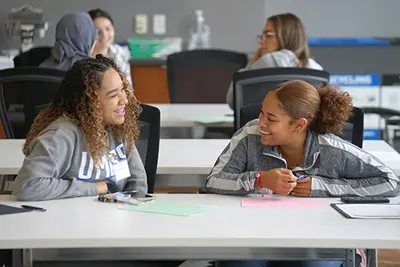$1 Million in New Federal Aid for Scholarships and Programs
 Image by Matt Hurwitz
Image by Matt Hurwitz
03/21/2023
By Katharine Webster
In Granada, Spain, during spring break, Alex Hutchinson marveled at the way Roman and Muslim rulers, Jewish settlers and Christian conquerors all left their mark on the ancient city.
“I really liked seeing the history,” says Hutchinson, a junior biomedical engineering major and first-generation college student. “You can see the influences of these different groups in the culture, the food, the architecture.”
The variety of cultural and historical artifacts reminded him of his hometown of Lowell, with its Greek, Cambodian, Irish, French Canadian and Puerto Rican neighborhoods and restaurants, says Hutchinson, whose family is Puerto Rican and Irish. But he also appreciated Granada’s differences.
“I loved the very close-to-earth feel. The buildings are smaller, the streets are smaller,” Hutchinson says. “Everything felt like a small town.”
 Image by Courtesy
Image by Courtesy
Also new this spring: a one-day conference on campus organized by junior and senior RHSA peer and team leaders for younger first-gen students at UML, defined as any student whose parents or guardians do not have a four-year college degree.
And on Wednesday, March 29, the RHSA will formally open its new offices and study space on the third floor of O’Leary Library.
The first-gen conference and study abroad course are part of an expansion of the RHSA’s programs and scholarships that is being funded by grants from nonprofits and federal aid: $500,000 last year and an appropriation of $1 million this year, obtained with help from U.S. Sen. Edward Markey and U.S. Rep. Lori Trahan (both first-generation college graduates themselves).
The bulk of the new federal money will go toward scholarships and funding for students to be involved in academic enrichment and career-related experiences, Hurwitz says. Many first-gen students struggle to access such opportunities because they are juggling academics with work and family responsibilities.
“We want to provide students with opportunities to learn about research with faculty and find out if that interests them,” he says. “We also want them to have access to career readiness experiences on campus and beyond, and other high-impact experiences like study abroad.”
For Jessica Tran, a junior business major with concentrations in marketing and entrepreneurship, one high-impact opportunity is helping to organize Saturday’s conference offered by and for first-gen students: Finding Identity, Resources and Strategies Together (F.I.R.S.T.)
 Image by K. Webster
Image by K. Webster
Tran says that in high school in Quincy, Massachusetts, she felt “out of place” and thought she might not be college material. She spent her first year at UML taking classes online due to the COVID-19 pandemic, and she had to adjust to a whole new set of expectations when she arrived on campus as a sophomore. “It was a shock,” she says.
The RHSA helped her through that. Now, she and four other student conference organizers want to help newer first-gen students. With support from a core team of faculty and staff, they are planning breakout sessions on financial wellness, mental health and career planning, as well as impostor syndrome. Students can get professional portraits taken at a photo booth, too.
“First-generation students want to hear about all of these things,” Tran says. “We’re hoping they feel they can be prepared and supported by the RHSA.”
Spanish Assoc. Prof. Daniel Arroyo-Rodríguez, a faculty mentor for the RHSA who is helping with the conference, says the RHSA hopes to offer it every one to two years and to open it up to first-gen students from around New England in the future.
The new federal funding also will allow the RHSA to offer more study abroad courses to different destinations and at different times of year, such as during winter intersession or summer break, Hurwitz says. Arroyo-Rodríguez, a native of Seville, Spain, may be teaching the spring semester course next year, according to Hurwitz.
 Image by Matt Hurwitz
Image by Matt Hurwitz
The class meets three times a week in person or online, and students do a lot of reading and writing. Before going to Granada, each student also researched and prepared a presentation for the rest of the class on a different aspect of Spanish life. For the remainder of the semester, they will work on and present their final projects: multimedia travelogues.
Presley Bennett, a sophomore nutritional science major who, like Hutchinson, had never been outside the U.S. before, researched and presented on dance and music. She grew up studying tap, ballet, jazz, hip-hop and modern dance, so going to a flamenco show was a highlight of her Granada experience.
“I’ve been a dancer my whole life, so that was amazing to see a different kind of dance,” she says.
Now she hopes to study abroad again so she can become more fluent in Spanish, which she studied throughout high school – and maybe even take a flamenco class.
For business major Rebecca Zhou, who studied AP Spanish in high school, immersing herself in Spain’s language, culture, food and art – especially the Picasso Museum of Málaga -- was the most memorable aspect of the journey. She also cherishes the relationships she has formed with others in the group.
“Visiting the Alhambra, seeing the flamenco show and the museums we visited … just enjoying the beauty of the architecture and the environment, it was something new to me, and I really loved it,” she says. “And that bond is really helpful and valuable to me.”




